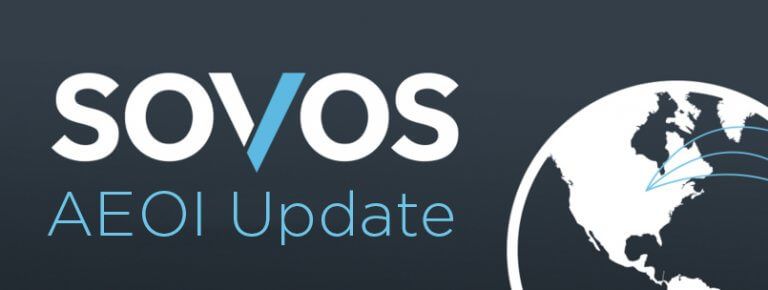Blog
The UK government has introduced draft legislation that would apply VAT to telecommunications services used outside of the European Union by private UK customers. Under current “use and enjoyment” provisions, such services are not subject to VAT when used outside of the EU. The government claims that this change will remove any ambiguity about place […]

Automatic Exchange of Information (AEOI) legislation is constantly evolving worldwide as the standard is rolled out around the world. The Sovos Regulatory Analysis team continually monitors new regulations and updates across the globe and publishes them in our Regulatory Feed. Here are some important changes that occurred in recent weeks: IRS Releases Draft Instructions for FATCA […]
Montana recently announced in its Employers’ Withholding Tax Guide that they have moved up their reporting due date for forms with Montana state withholding. Forms MW-3, W-2, and 1099s with Montana state withholding are now due by January 31st. Previously, these forms were due on February 28th.
Spain has issued Ministerial Order HFP/2017, which establishes the technical requirements for the implementation of the Immediate Remittance of Information system, locally known as SII. According to this new order, the effective date of the mandate is July 1, 2017. The order officially describes the information that should be sent to the Spanish tax authorities for […]

Massachusetts is attempting to avoid a head-on challenge to Quill, opting instead for rules that stretch — but attempt not to break — the physical presence standard. Internet vendors should take serious note of Massachusetts’ new approach to defining what constitutes physical nexus. If you partake in one of these three types of common activities, […]
Last July the City of Tacoma, Washington passed Ordinance No. 28367, a “Bring Your Own Bag Ordinance.” This law bans the distribution of disposable plastic bags by retailers and imposes a minimum five cent fee on paper bags. Retailers (including restaurants), will be allowed to keep this fee. The law does not apply to bags for […]
The short-lived American Health Care Act (AHCA) legislation came to an anticlimactic end, as Congress neglected to hold a vote on the bill after failing to gain adequate support. President Trump’s executive order to “ease the burdens” of the ACA still stands, and executive agencies including the IRS and the Department of Health and Human Services […]
On May 18, the Indian GST Council met and determined the GST rate applicable to specific goods and services. The rate structure was set previously, containing four slabs (5%, 12%, 18% and 28%) and a zero rate. The new rate schedules were published by the Central Board of Excise and Customs and are available here under “GST Rates.” The […]
The IRS has published the 2017 draft of the Instructions for Form 8957, Foreign Account Tax Compliance Act (FATCA) Registration. The purpose of this publication is to provide guidance to Financial Institutions and Direct Reporting Non-Financial Foreign Entities (NFFEs) in registering themselves and their branches (if applicable) as one of the following: Participating Foreign Financial […]
The Thai Revenue Department has released a previously given presentation that provides details on the process of submitting FATCA transmittals in Thailand. The presentation offers instructions on the FATCA IGA generally, sending a report file via IDES, and preparing a report file according to the FATCA XML Schema v2.0. SinceThailand has adopted a Model 1, […]

It has been a while since we posted news about Russia. To recap: e-invoicing is regulated but optional. Issuance is done via accredited operators, whereby both supplier and buyer must participate in a duplex clearance choreography. For more background, see previous posts. Interoperability across operators (called “roaming” in Russia – a misnomer) has been an […]
The Finnish parliament (the Riksdag) is presently considering Bill No. 45/2017, which would change the way VAT is collected on imports into the country. Under section 3.3 of the bill, the responsibility for import VAT collection would shift from the customs authority to the tax administration. Importers would account for import VAT via their tax […]
On May 16, Sweden’s Supreme Administrative Court ruled that a “parent company is allowed to deduct input VAT in respect of consultancy services acquired in connection with the sale of shares in subsidiaries during the restructuring of operations,” on the grounds that “the costs of the services [are] considered to have a direct and immediate link with […]
The Estonian Ministry of Finance has issued draft amendments to the VAT Act. The amendments affect the treatment of motor vehicles that are used for both business and non-business purposes. The draft law, 17-0510, can be viewed at Estonia’s online database, Eelnõude infosüsteem (EIS).
On May 16 the Court of Justice of the European Union ruled against Luxembourgian tax authorities in an appeal from taxpayer Berlioz Investment Fund SA in Case C-682/15. The Luxembourg authorities had demanded certain documents that Berlioz failed to produce in the requested detail, resulting in the imposition of a €250 000 fine. Berlioz appealed […]
The lower house of the Italian parliament, the Chamber of Deputies, is considering Bill No. 4477 which, if enacted, would reduce the VAT rate on certain childcare items to 4%. Specified items include diapers, high chairs and strollers. This measure seeks to reduce the tax burden faced by young families: the bill’s preamble links Italy’s […]